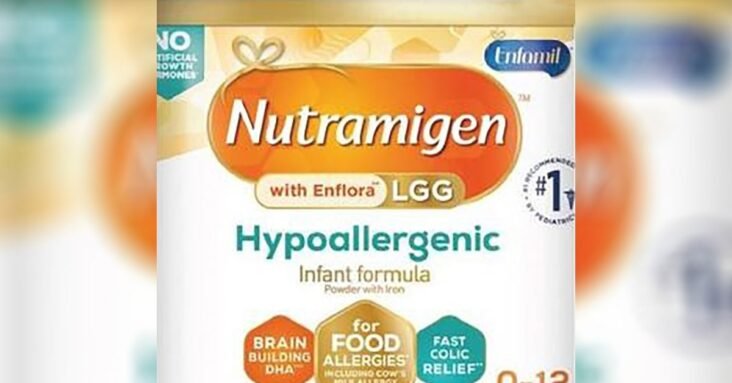
Thousands of cans of Reckitt/Mead Johnson Nutrition’s infant formula sold in the U.S. are being recalled, the Food and Drug Administration announced Sunday. The recall comes after Israeli health authorities confirmed a type of bacteria called Cronobacter sakazakii was found in cans that were being imported into Israel from the U.S.
The recall includes 675,030 cans sold in the U.S., the FDA says, which were produced at a Mead Johnson plant in Zeeland, Michigan starting in June 2023.
A Reckitt spokesperson said the cans for the U.S. market had been manufactured separately, but were recalled because they were produced in the facility around the same time.
All tests conducted by the FDA have tested negative, the spokesperson said, including a sample from the batch that had been sent to Israel.
“Reckitt/Mead Johnson understands the incredible responsibility we have in providing what is often the sole nutrition for infants, and there can be no short cuts for this vulnerable population — therefore, we chose to recall select batches of Nutramigen out of an abundance of caution,” the company spokesperson said in an email. They said the factory continues to operate at full capacity.
So far, no reports of illnesses have been linked to the recalled products.

Cans in the recall of Mead Johnson’s Nutramigen Hypoallergenic Infant Formula Powder can be identified by batch codes listed on the FDA’s website, which include:
- ZL3FHG (12.6 oz cans)
- ZL3FMH (12.6 oz cans)
- ZL3FPE (12.6 oz cans)
- ZL3FQD (12.6 oz cans)
- ZL3FRW (19.8 oz cans)
- ZL3FXJ (12.6 oz cans)
Reckitt says their Mead Johnson Nutramigen formula ranks as the best selling brand globally for children with cow milk allergies. The recalled cans make up a small share of the formula produced by Reckitt, the spokesperson said, which is otherwise not being recalled.
“Based on the limited availability of the remaining stock of this special infant formula, it is believed that much, if not all, of the products recalled in the United States have been consumed,” Reckitt said in its recall notice.
Customers can contact the company for a refund by calling 866-534-9986 or by emailing consumer.relations@rb.com.
Cronobacter bacteria risks and symptoms
Illnesses connected to Cronobacter are rare, but they can be deadly in infants, according to the Centers for Disease Control and Prevention. Cronobacter sakazakii, a germ found naturally in the environment, can live in dry foods, including powdered infant formula, powdered milk, herbal teas and starches. Powdered formula can get contaminated in the home after being opened.
Cronobacter was behind the outbreak linked to Abbott’s infant formula in 2022 that amounted to millions of recalled cans. Other sources of Cronobacter have also been linked to serious infections in babies fed contaminated milk, like from using poorly sanitized breast pump equipment.
The bacteria can cause severe, life-threatening infections or meningitis, according to the recall alert. Symptoms may include poor feeding, irritability, temperature changes, jaundice, grunting breaths and abnormal movements.
On Dec. 28, the FDA says it recommended that Mead Johnson initiate a recall for the product after Israeli authorities confirmed the Cronobacter sakazakii contamination through genomic sequencing. The company agreed to recall the formula on Dec. 29.
FDA inspections at the plant
The FDA says Mead Johnson’s plant in Michigan is now also facing an inspection as a result of the contamination discovered by Israeli health officials, which was first reported to the agency on Dec. 14.
“While the FDA’s inspection is ongoing, all testing conducted to date by the FDA and Reckitt/Mead Johnson Nutrition has been negative for Cronobacter,” the FDA said.
A company spokesperson said the inspection included samples collected from around the facility’s environment, all of which so far have turned up negative.
In an email Tuesday, an FDA spokesperson said their inspection of Reckitt’s facility has not yet been completed.
“As the inspection is ongoing, we are not able to provide a timeline for completion,” the agency spokesperson said.
Reckitt’s Mead Johnson was one of three baby formula manufacturers to face warning letters from the FDA in August. Among the issues scrutinized by the agency were detections of Cronobacter in “high and critical hygiene zones” of the Zeeland plant.
FDA records show another inspection of the same facility had ended just weeks before.
After that visit, the FDA cited the factory for falling short on precautions needed to ensure that its product did not become contaminated by “microorganisms in the formula or in the processing environment.”



